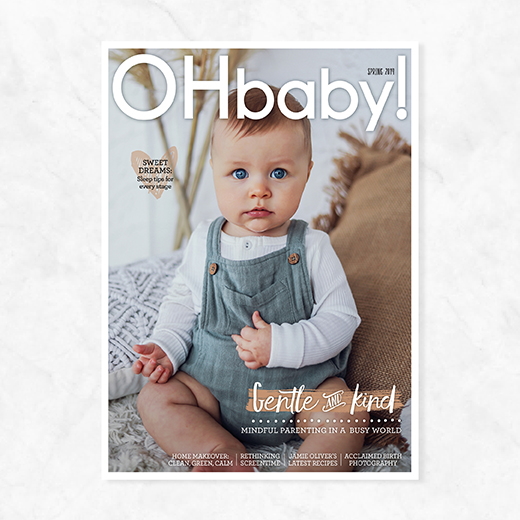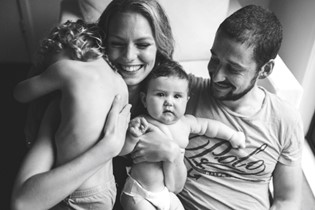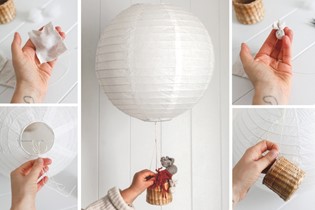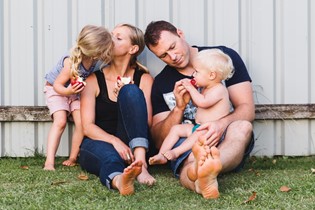The impact of busyness on modern-day families

Could you and your family benefit from a slower pace? Marianne Falconer explores the impact of busyness on modern-day parenting.
Having been described as ‘ambition in heels’ when I worked in the corporate world, the idea of ‘go slow parenting’ didn’t exactly come naturally to me. And if you look around, it doesn’t appear to come naturally to our current society either. We experience the benefit of many conveniences that save us time and make our lives far more efficient than before – think cars, dishwashers, WiFi, smart phones and online shopping. So, how is it that we seem to have less spare time? We live in a society where we measure ourselves by how much we do: accolades follow achievements. Busy people are considered important and successful, and we’re rewarded based on doing, not for simply being. Who can blame us if we’re all running this race called life at break-neck speed? After all, everyone likes a little reward and recognition, and if you don’t get remunerated or praised for living a slow but satisfying life, it’s little wonder that we’re all a bit hooked on the endorphins and accolades that come with busyness.
A fast-paced life can be attractive, but I’ve found busyness to be at odds with parenting – or should that be with enjoying parenting. Kids and schedules don’t really gel. In fact, kids seem to oppose schedules. If we have to be somewhere on time, it usually involves the persistence of a Jack Russell to get my kids to go and clean their teeth or put on their shoes. And how often have you discovered a soiled nappy just when you thought you were finally ready to buckle your little ones into their carseats? At moments like these I tend to get frazzled – even though my kids’ ‘alternative schedules’ are developmentally normal for their ages and stages. My worst parenting moments can be linked to ‘getting out the door on time’ (anyone with me?). It seems that the more tightly scheduled we are, the more opportunities there are for stress in our lives.
LIFE IN THE FAST LANE
According to a podcast by John Mark Comer, you’re suffering from the ‘busy disease’ when:
 You move from one check-out line to the other at the supermarket, always looking for the shortest queue.
You move from one check-out line to the other at the supermarket, always looking for the shortest queue.
 Approaching a red light you count the cars in each queue and change lanes accordingly, so you can get to where you’re going faster.
Approaching a red light you count the cars in each queue and change lanes accordingly, so you can get to where you’re going faster.
 You multi-task to the point where you forget what you’re doing halfway through a task.
You multi-task to the point where you forget what you’re doing halfway through a task.
Sound familiar? It seems that ‘busy’ is more common than the common cold!
DRIVEN BY FOMO
If busyness is as unpleasant as I’ve described, then what’s stopping us from putting on the brakes? Is fear of missing out (FOMO) driving us to keep our foot on the accelerator? Do I say ‘Yes’ to every play date invitation and sign my kids up for extra curricular activities because I want them to have fun, or am I perhaps projecting a form of parental FOMO onto my children? One thing I know is that I don’t want to make fear-based decisions; I want to be intentional about how I parent.

WHAT IS SLOW PARENTING?
Slow parenting is a conscious decision to be counter-cultural, and to make time for connection and the things we value. According to Carl Honoré, author of In Praise of Slow, the slow movement doesn’t mean doing everything at a snail’s pace, it just means doing everything at the right speed. For parents, Honoré says this implies valuing quality over quantity, being present and living in the moment. “The slow philosophy can be summed up in a single word: balance” writes Honoré. “Slow parenting is about bringing balance into the home. Slow parents give their children plenty of time and space to explore the world on their own terms. They keep the family schedule under control so that everyone has enough downtime to rest, reflect and just hang out together.”
TIME IS A CONSTRUCT
It’s hard to imagine, but there once was a time when clocks didn’t rule our lives. In those days, you rose with the sun and went to bed when it set. In fact, the first town to have a public clock was Milan in Italy, around 1330. Wearing wrist watches didn’t become common place until early in the 20th century, and electronic watches weren’t invented until the 1960s. Now we live in a world where we can’t imagine starting the day without an alarm clock interrupting our precious hours of sleep. Breaking the day into tightly scheduled periods, such as your baby’s 45-minute sleep cycle or lawyers’ billable hours, is really quite a modern concept. And while time certainly has great value, it can be quite a harsh taskmaster. When you acknowledge that life once happily existed without the level of clock-watching that we do today, you realise it might actually be time for the pendulum to swing back a bit, so we can rediscover that slower pace. Perhaps it’s time for us to become the masters of time, and not the other way around.
|
SIX STEPS TO SIMPLIFYING LIFE 1. Think about the things you value in life and write them down. A helpful way to determine what your values are is to think about what you’d like to be remembered for, ie authenticity, achievement, friendship, family, fun, responsibility, wisdom. 2. What things do you do that help you ‘be in the moment’? Identify those things and make room for them each week. 3. Review the activities of your past week and note whether or not they align to your values. Circle those that do and put a cross next to the things that don’t. 4. Create a family schedule and add first the things that are important to you and the non-negotiables like work or school. Knowing your priorities helps you clarify where you should be spending your time. 5. Picture yourself saying ‘No’ to things that don’t align with your values. Practise saying it so you don’t succumb to pressure and say ‘Yes’ when you really mean ‘No’. 6. Schedule in rest for you and your family. |
ROOM FOR REST
I’ll always be grateful for the advice given to me by the midwife who ran my antenatal classes. She recommended resting when the baby slept, and eating when the baby ate. That advice acknowledged the challenges we mums would face when it came to simple things like eating and resting. I really took her advice to heart –my sanity depended on those Nana naps! In his book Simplicity Parenting: Using the Extraordinary Power of Less to Raise Calmer, Happier, and More Secure Kids, Kim John Payne suggests that “A half hour or an hour of quiet, restful solitary time during the day is restorative at any age, and a habit worth cultivating”. So schedule rest into your days and weeks and your body will thank you for it, as will your family.
WHAT'S THE SOLUTION?
Because time is a finite resource, we’ll never be able to create more of it. We just need to simplify our lives so there’s less to do in the time we have. For us as parents, it’s about being intentional in how you spend your time, and about creating a schedule and pace that works for you and your family.
All of my favourite parenting moments happen when I’m ‘in the moment’ and have found time to simply ‘be’. They’re when I’m laughing and play fighting with my kids, sitting on the floor making Lego creations with them, or splashing in the waves at the beach. I’m a fan of author Stephen Covey’s bestselling book The 7 Habits of Highly Effective People. In it he says “You achieve inner peace when your schedule aligns to your values”. This means the concept of slow parenting will be different for everyone, and that’s okay because our values naturally differ. What’s important is that our daily lives align to what we value. When I think about the times I feel most at peace, it’s in moments when I am prioritising connection with my kids, spending time outdoors, and ticking a few things off my to-do list. I feel peaceful after doing these things because I value family, nature and productivity. However, the reality is, unless I intentionally schedule these things into my days, they’re likely to just not happen!
If you’re considering adopting a slower pace of life, Carl Honoré has some good news. “Spending more time with friends and family costs nothing. Nor does walking, cooking, meditating, making love, reading or eating dinner at the table instead of in front of the television. Simply resisting the urge to hurry is free.”

AS FEATURED IN ISSUE 47 OF OHbaby! MAGAZINE. CHECK OUT OTHER ARTICLES IN THIS ISSUE BELOW

















